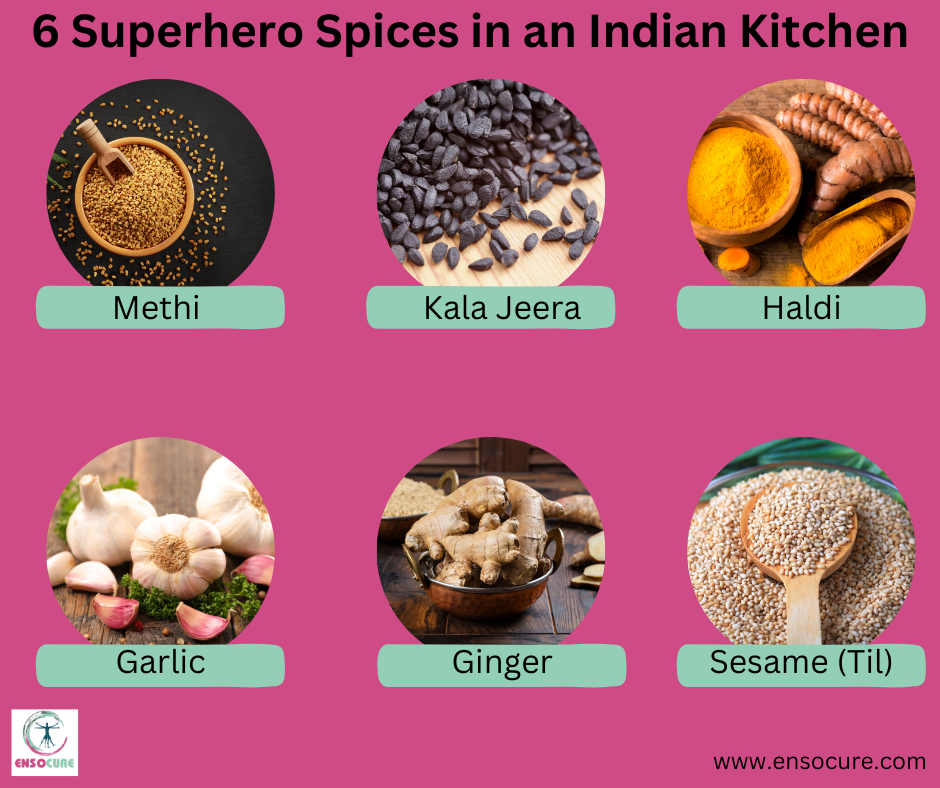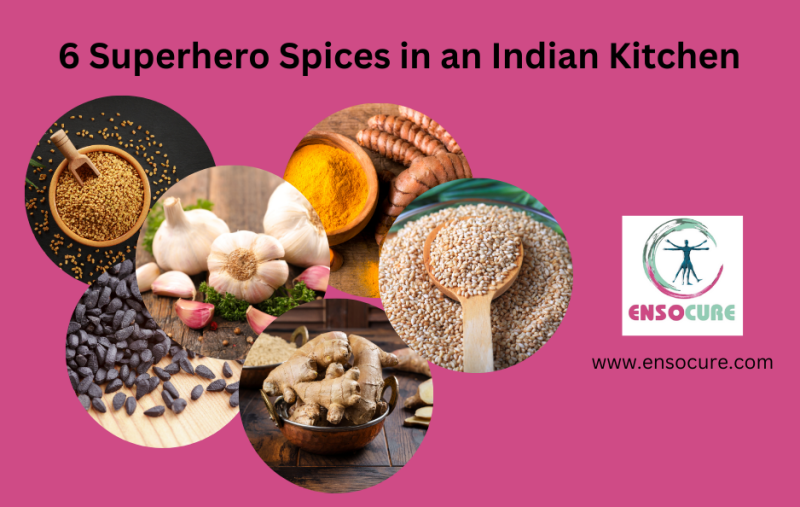While several of us are aware of the health aspects of various Indian spices, we do not really know what makes them healthy. What are the ingredients in spices like Nigella seeds whose medicinal properties have been used for centuries. Here are 6 healthy spices that can be rightly called superheroes of an Indian kitchen.

1. FENUGREEK-(METHI)
Recent studies have found how fenugreek and apple cider vinegar are two of the most potent agents that help those with type 2 diabetes effective at reducing fasting blood glucose and A1c levels. Fenugreek ((Trigonella foenum-graecum) as found by studies seems to slow down sugar absorption and acts as an insulin stimulating agent. It could also improve levels of testosterone and estrogen improving libido. While some Indian studies feel fenugreek is also effective in BPH ( Bening Prostate Hyperplasia) or enlarged prostate, more studies are needed to provide concrete evidence. The best way to consume fenugreek for its complete effects is to soak one tablespoon of methi seeds and drink the water the next morning.
2. GINGER (ADRAK)
Since antiquity people have been using ginger for nausea and stomach pain. Ginger contains gingerol, its main bioactive compound which is a potent anti-inflammatory and antioxidant agent. Studies have found how ginger was useful in chemo induced nausea, muscle recovery, decrease in blood sugar, and reduces inflammation in osteoarthritis. One study in 2017 also found ginger to contain protective properties against cardiovascular disease, hypertension, diabetes, hyperlipidemia, cerebrovascular disease, and fatty liver disease, among other chronic conditions.
The best way to consume ginger for optimum benefits is to boil crushed ginger and consume the water or brew it in a tea. Ginger with lemon and honey is an age-old remedy for cough.
3. TURMERIC (Haldi)
Among healthy spices, extensive studies have proved how turmeric because of its main ingredient curcumin is an anti-inflammatory in joint pain and arthritis, promotes skin health, kidney health, metabolic syndrome, and anxiety. Some people use turmeric supplements to manage conditions like osteoarthritis and rheumatoid arthritis. There are a few studies which suggest that curcumin may have anticancer properties by interfering with cancer development, growth, and spread. However, more research is needed in this area.
Curcumin may contribute to heart health by improving the function of the endothelium (the lining of blood vessels), reducing inflammation and oxidation, and improving risk factors associated with heart disease. Turmeric has also been studied for its potential role in preventing and treating neurodegenerative diseases like Alzheimer’s disease. It may also cross the blood-brain barrier, which is a protective barrier for the brain. Turmeric may help with digestive issues, including indigestion and bloating by stimulating bile production, and improving digestion. By far the biggest use of turmeric in India is to promote health skin.
It’s important to note that while turmeric has these potential benefits, its bioavailability is limited, meaning that the body doesn’t absorb it well. Combining turmeric with black pepper, which contains piperine, can enhance absorption. Individual responses to turmeric can vary, and it’s always a good idea to consult with a healthcare professional before using turmeric supplements, especially if you have underlying health conditions or are taking medications.
4. SESAME SEEDS (TIL)
Sesame seeds, derived from the Sesamum indicum plant, have been consumed for centuries and are known for their rich nutritional profile. Sesame seeds are a good source of healthy fats, protein, B vitamins, minerals, fiber, antioxidants, and other beneficial plant compounds. Studies have found how sesame seeds can help control blood sugar, arthritis, and cholesterol.
The high content of monounsaturated and polyunsaturated fats in sesame seeds, along with other compounds, may contribute to heart health by helping to lower cholesterol levels. The lignans in sesame seeds have also been associated with cardiovascular benefits. Sesame seeds are also a good source of selenium, a key component of enzymes involved in the production of thyroid hormones, which means sesame seeds could well benefit those with hypothyroidism.
It’s worth noting that while sesame seeds offer numerous health benefits, moderation is key. They are calorie-dense, so consuming them in appropriate portions as part of a balanced diet is recommended.
5. NIGELLA SEEDS (KALA JEERA)
Nigella seeds, also known as black seeds or black cumin seeds, are derived from the plant Nigella sativa. These seeds have been used in traditional medicine for centuries and are known for their potential health benefits. It’s important to note that while some studies suggest these benefits, more research is needed, and individual responses may vary.Studies have found black cumin benefits the immune system, enhances brain function, and protects the body from various chronic diseases, including type 2 diabetes and heart disease.
Nigella seeds have been traditionally used to support respiratory health. They may have bronchodilator effects, potentially aiding in conditions like asthma and bronchitis.
6. GARLIC
Garlic due to allicin has found to have antifungal, antibacterial, anti-inflammatory properties. It increases immunity, aids digestion lowers cholesterol, blood pressure and has been found to act like a blood thinner. Garlic may also improve circulation and decrease the risk of cardiovascular diseases.
Garlic has natural antibacterial and antiviral properties, which may help combat infections. It has been traditionally used to treat respiratory infections and colds and has prebiotic properties, supporting the growth of beneficial gut bacteria. Garlic supports the liver’s natural detoxification processes. It helps the body eliminate toxins and promotes overall liver health. However, those on blood thinners are advised to avoid garlic supplements.
Despite being healthy spices, taking high doses of extracts of these ingredients needs a doctor’s advice especially if you are already on blood thinner medications or those that reduce cholesterol, high blood pressure, high blood sugar and thyroid. The remedies mentioned here are not intended nor a substitute for medication and medical advice.

